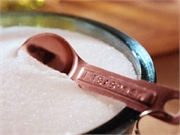Sweet-Tooth Tendencies Change as Kids Get Older: Study

MONDAY, Aug. 31, 2020 (HealthDay News) -- Young people seldom say a food or drink is "too sweet." A new study suggests that may be because they're less sensitive to sugar than adults and prefer more of it.
Researchers found that compared to adults, kids and teens needed 40% more sugar in a solution to detect sweetness.
The researchers also found that young people have a bigger "sweet tooth" than adults, or prefer more intense sweetness, a finding that echoes previous studies.
The study included almost 500 children, teens and adults. The researchers gave participants sugar-water concoctions with different levels of sugar. They measured how much sugar the participants preferred and the lowest concentration required for them to taste it.
"Both of these dimensions of sweet-taste perception -- sensitivity and preference -- undergo distinct developmental trajectories from childhood to adulthood," said study co-author M. Yanina Pepino, an assistant professor of nutrition at the University of Illinois at Urbana-Champaign.
"However, they did so independently, and we found no association between the two," she said in a university news release.
Adults could taste a single cube of sugar dissolved in 56 ounces of water, while younger participants could only taste it in a less-concentrated solution -- 40 ounces.
The study also found that children and teens preferred a 50% higher sugar concentration. Researchers explained that the adults' preferred sweetness level was equivalent to eight sugar cubes in an 8-ounce glass of water -- comparable to a cola drink -- while kids preferred 12 cubes in the same amount of water.
The results were published recently in the journal Nutrients.
More information
There's more about sugar consumption at the U.S. Centers for Disease Control and Prevention.

The news stories provided in Health News and our Health-E News Newsletter are a service of the nationally syndicated HealthDay® news and information company. Stories refer to national trends and breaking health news, and are not necessarily indicative of or always supported by our facility and providers. This information is provided for informational and educational purposes only, and is not intended to be a substitute for medical advice, diagnosis, or treatment.

